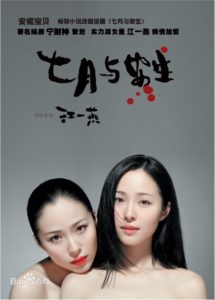SoulMate
七月与安生
Hong Kong/China, 2016, colour, 2.35:1, 108 mins.
Director: Zeng Guoxiang 曾国祥 [Derek Tsang].
Rating: 8/10.
Impressive tale of (female) friendship sports two remarkable leads and a subtly clever script.
Shanghai, the present day. Li Ansheng (Zhou Dongyu), who works at an electrical company, is tracked down by a publisher who wants to buy the rights to the unfinished online autobiographical novel Qiyue and Ansheng 七月与安生 written by Lin Qiyue. The publisher, who wants to turn it into a film but cannot trace Lin Qiyue, thinks Li Ansheng can help in tracing her, as it is her story from the age of 13 to 26. Li Ansheng says she doesn’t read online novels and it is not her but another woman with the same name. On the metro she bumps into Su Jiaming (Li Chengbin) whom she and Lin Qiyue used to know; he’s been following the online novel, but Li Ansheng doesn’t want to talk to him and runs off. At home she reads the novel online and her memory goes back to when she (Li Haofang) and Lin Qiyue (Yao Xinyan) first meet at the age of 13 at junior high school in their hometown of Zhenjiang city, Jiangsu province. They bond immediately and become inseparable. As her father is dead and her mother (Meng Tingyi) is always away on business, Li Ansheng spends a lot of time at Lin Qiyue’s home, where her mother (Li Ping) and father (Cai Gang) take a liking to her. At the age of  15, Lin Qiyue (Ma Sichun) graduates to senior high but Li Ansheng (Zhou Dongyu) goes to a vocational school and starts earning money by working in a bar. One evening she shows Lin Qiyue a room she’s rented; she says she wants to be independent, travel the world, and die at the age of 27. Lin Qiyue tells her about a boy, Su Jiaming, she likes at school, and Li Ansheng secretly meets him to tip him off. The three become a close-knit group but Li Ansheng finds herself falling for Su Jiaming and deliberately leaves for Beijing, following a rock guitarist (Sha Quanze) who likes her. For four years, from the age of 19 to 23, they stay in touch with postcards: Lin Qiyue goes to the same university as Su Jiaming, studying Economics, but eventually starts working in a bank, while Li Ansheng eventually ditches the guitarist and travels widely with her new boyfriend, a film cameraman. Li Ansheng eventually returns home for her mother’s funeral, tired of travelling; meanwhile, Su Jiaming has moved to Beijing for two years prior to marrying and settling down with Lin Qiyue. The two young women celebrate getting together again by taking a trip to Shanghai; but after a serious argument, Li Ansheng walks off and disappears. Two years later Li Ansheng meets Su Jiaming by chance in Beijing and hears he and Lin Qiyue are still intending to get married. Li Ansheng says she is planning to moved to Canada with the new man in her life. But then tragedy strikes, throwing all the relationships into chaos and revealing some deeply held secrets.
15, Lin Qiyue (Ma Sichun) graduates to senior high but Li Ansheng (Zhou Dongyu) goes to a vocational school and starts earning money by working in a bar. One evening she shows Lin Qiyue a room she’s rented; she says she wants to be independent, travel the world, and die at the age of 27. Lin Qiyue tells her about a boy, Su Jiaming, she likes at school, and Li Ansheng secretly meets him to tip him off. The three become a close-knit group but Li Ansheng finds herself falling for Su Jiaming and deliberately leaves for Beijing, following a rock guitarist (Sha Quanze) who likes her. For four years, from the age of 19 to 23, they stay in touch with postcards: Lin Qiyue goes to the same university as Su Jiaming, studying Economics, but eventually starts working in a bank, while Li Ansheng eventually ditches the guitarist and travels widely with her new boyfriend, a film cameraman. Li Ansheng eventually returns home for her mother’s funeral, tired of travelling; meanwhile, Su Jiaming has moved to Beijing for two years prior to marrying and settling down with Lin Qiyue. The two young women celebrate getting together again by taking a trip to Shanghai; but after a serious argument, Li Ansheng walks off and disappears. Two years later Li Ansheng meets Su Jiaming by chance in Beijing and hears he and Lin Qiyue are still intending to get married. Li Ansheng says she is planning to moved to Canada with the new man in her life. But then tragedy strikes, throwing all the relationships into chaos and revealing some deeply held secrets.
REVIEW
It took four writers, four editors, three DPs and two composers but SoulMate 七月与安生, the first solo directing effort by Hong Kong actor Zeng Guoxiang 曾国祥 [Derek Tsang], 36, is a deeply impressive film that shows none of the usual scars of multiple authorship. The tale of two BFFs who fall for the same man, it follows Zeng’s two co-directing gigs with writer Yin Zhiwen 尹志文 [Jimmy Wan] – the thin portmanteau drama Lover’s Discourse 恋人絮语 (2010) and the way more superior, offbeat rom-com Lacuna 醉后一夜 (2012) – and manages to maintain Lacuna‘s fine balance between content and performance despite a less tricksy script. Given his background – as the actor son of veteran Zeng Zhiwei 曾志伟 [Eric Tsang] – it’s hardly surprising Zeng has always shown an eye for smart casting and rounded playing, and SoulMate is as much a tour de force for its two leads, Mainland actresses Zhou Dongyu 周冬雨 and Ma Sichun 马思纯, as Lacuna was for Zhang Jingchu 张静初 and Yu Wenle 余文乐 [Shawn Yue]. But it’s also much more: a mature, and ultimately very moving, study of (female) friendship and its submerged reefs.
 Stories of close female friendships that go awry are nothing new in Chinese cinema – in fact, the early arc of SoulMate‘s story is quite similar to that of recent Mainland indie Nezha 哪吒 (2014) – but Zeng’s film steers a careful course between being either too girly (spatty BFFs, boy problems etc.) or a closeted lesbian movie (lots of hugging and doleful looks). The source is a 1998 short story of the same Chinese name by Qing Shan 庆山 – Ningbo-born online writer Li Jie 励婕, 42, whose previous pen name was Anni Baobei 安妮宝贝 (“Annie Baby”) – that was first published online in 1998 and then as part of her first short-story collection, 告别薇安, in 2000. The story was first adapted into a musical play, showcasing Mainland actress Jiang Yiyan 江一燕, that toured China in 2011 (see poster, left); it’s also been made into a 2002 comic book, and a TV drama series is in the works.
Stories of close female friendships that go awry are nothing new in Chinese cinema – in fact, the early arc of SoulMate‘s story is quite similar to that of recent Mainland indie Nezha 哪吒 (2014) – but Zeng’s film steers a careful course between being either too girly (spatty BFFs, boy problems etc.) or a closeted lesbian movie (lots of hugging and doleful looks). The source is a 1998 short story of the same Chinese name by Qing Shan 庆山 – Ningbo-born online writer Li Jie 励婕, 42, whose previous pen name was Anni Baobei 安妮宝贝 (“Annie Baby”) – that was first published online in 1998 and then as part of her first short-story collection, 告别薇安, in 2000. The story was first adapted into a musical play, showcasing Mainland actress Jiang Yiyan 江一燕, that toured China in 2011 (see poster, left); it’s also been made into a 2002 comic book, and a TV drama series is in the works.
For the film, Hong Kong producer Chen Kexin 陈可辛 [Peter Chan] is on record as saying the short story took considerable fleshing out to make into a feature-length script. But it seems to have been done in the right spirit by the four screenwriters: Hong Kong novelist Lin Yongchen 林咏琛 – whose Symbiosis 共生 (a psychodrama centred on two women in a sanatorium) was filmed, not well, as Virtual Recall 异空危情 (2010) – and Mainlanders Wu Nan 吴楠 (Feng Shui 万箭穿心, 2012), Xu Yimeng 许伊萌 (A Young Girl’s Destiny 逆袭, 2013) and Li Yuan 李媛. The movie still runs about 10 minutes too long, and could have done with fewer TVD-like twists after the main one at the 88-minute point; but Lin and her fellow distaff writers have done a sensitive job that freshens up a familiar genre.
Though many of the elements are thoroughly generic – female schoolpals, one from a happy and one from a broken home, one a caged middle-class bird, one a freewheeling rebellious sprit – the script has an interesting structure that delivers the ingredients in a challenging way. Each girl’s development mirrors the other’s but not at the same time: while Li Ansheng is enjoying a bohemian life in Beijing with a rock guitarist and a film cameraman, Lin Qiyue is a good girl at university down south and preparing to get married; and when Li Ansheng tires of the rootless life, Lin Qiyue starts spreading her wings. On top of this is a further structural layer in which the film is meant to be Li Ansheng’s own memories of the past that have been sparked by Lin Qiyue’s online autobiographical novel; the unravelling of this past-present structure gives rise to the movie’s multiple twists in the final 15 minutes.
Lacuna‘s structure was more self-consciously clever; SoulMates‘ is subtler and doesn’t get in the way of the performances. The elfin Zhou, 24, mistress of the Big Sad Smile (Under the Hawthorn Tree 山楂树之恋, 2010), has the showier role as onetime rebel Li Ansheng but in the second half moves over for Ma, 28, as her conventional, middle-class Lin Qiyue starts to develop some spunk. As well as managing to bond closely on-screen without evoking any Sapphic vibes, both actresses show a remarkable range: just as Zhou can switch from braggadocio to tender/tearful, so Ma (the rebellious friend in The Left Ear 左耳, 2015; the hard-arsed mercenary in Time Raiders 盗墓笔记, 2016) can switch from boringly nice to commandingly frank – especially in the crucial apartment scene between the two some 70 minutes in. If any actress laurels were to be awarded, it would be impossible to separate the two performances.
In his first leading role, Taiwan’s Li Chengbin 李程彬, 28, projects a suitably neutral, masculine presence that doesn’t get in the way of the two actresses and the film’s main relationship. Other roles are small, with veteran Li Ping 李萍, more often on TV nowadays, making the most impression as Lin Qiyue’s kindly mother.
The widescreen photography by Taiwan-based US d.p. Jake Pollock 包轩鸣 and Taiwan indie d.p. Yu Jingping 余静萍 (Zinnia Flower 百日告别, 2015) encompasses a large variety of moods and locations (girlhood, womanhood, closeness, alienation, Beijing, Shanghai) while seeming of a piece, plus some strikingly sharp photography of Russia by Mainland Steadicam maestro Yang Zhenyu 杨振宇 (Dearest 亲爱的, 2014). The piano-and-strings score by Japan’s Hatano Yusuke 波多野裕介 (Happiness 幸运是我, 2016) and Hong Kong’s prolific Jin Peida 金培达 [Peter Kam] is hardly original but still very effective thanks to careful spotting. Editing, led by Hong Kong’s Xu Hongyu 许宏宇 [Derek Hui], is as tight as a drum – so much so that the role of Li Ansheng’s businesswoman mother is unfortunately reduced to a single scene.
The Chinese title simply means “Qiyue and Ansheng”, and the girls’ two names literally mean “July” and “Quiet”. Japanese director Iwai Shunji 岩井俊二, who made the similar but more delicate Hana & Alice 花とアリス (2004), gets a thankyou in the end credits. The film was shot in Nanjing, Suichang, Shanghai, Beijing and Russia, and grossed a respectable RMB167 million in China.
CREDITS
Presented by Joycore Pictures (Shanghai) (CN), JQ Pictures (CN), Alibaba Pictures (CN), We Pictures (HK). Produced by We Pictures (HK), Joycore Pictures (Shanghai) Pictures (CN).
Script: Lin Yongchen, Li Yuan, Xu Yimeng, Wu Nan. Short story: Qing Shan [Anni Baobei]. Photography: Jake Pollock, Yu Jingping. Photography (Russia): Yang Zhenyu. Editing: Xu Hongyu [Derek Hui], Li Dianshi, Tan Xiangyuan, Zhou Xiaolin. Music: Hatano Yusuke, Jin Peida [Peter Kam]. Theme song: Dou Jingtong. Art direction: Zhai Tao. Costume design: Ye Jiayin. Styling: Wu Lilu [Dora Ng]. Sound: Yang Yuhui, Huang Zheng, Steve Miller. Visual effects: Weng Guoxian (yinyung.co).
Cast: Zhou Dongyu (Li Ansheng), Ma Sichun (Lin Qiyue), Li Chengbin (Su Jiaming), Li Haofang (young Li Ansheng), Yao Xinyan (young Lin Qiyue), Li Ping (Lin Qiyue’s mother), Meng Tingyi (Li Ansheng’s mother), Zhu Haoran (literary editor), Cai Gang (Lin Qiyue’s father), Jiang Tingxuan (Li Tongtong, Li Ansheng’s daughter), Sha Quanze (rock guitarist).
Release: China, 14 Sep 2016; Hong Kong, 27 Oct 2016.
